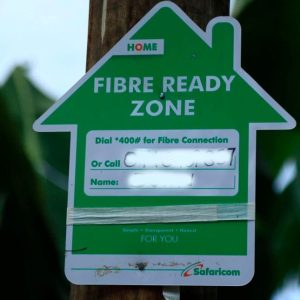Business
Trick Out: Safaricom Silently Slashed Data Bundles By Half and Doubled Cost For Customers
Every customer who has been affected by these stealth cuts should file a complaint with the Communications Authority.

In what can only be described as corporate highway robbery, Safaricom has pulled off one of the most audacious consumer rip-offs in Kenya’s telecommunications history.
Over the weekend, while Kenyans were winding down, the country’s largest telco was busy executing a stealth operation that would see millions of subscribers wake up to data bundles that had been slashed by more than half, effectively doubling the cost of internet access overnight.
The move is brazen, calculated, and reeks of the kind of impunity that comes from knowing you control over 62 percent of the mobile broadband market.
When you’re that big, apparently, you can get away with anything, including treating your customers like they’re too stupid to notice when you’ve just picked their pockets.
Let’s be clear about what happened here.
Safaricom didn’t send out a press release.
They didn’t issue a statement.
There was no customer notification, no email, no SMS warning. They simply went into their systems and chopped the data allocations in half, hoping nobody would notice until it was too late.
This is the telecommunications equivalent of a thief in the night, except this thief has a corporate logo and a customer service Twitter account.
The numbers tell a story of pure greed.
Under Safaricom’s so-called ‘No Expiry’ packages, which were marketed as offering indefinitely valid bundles at fixed rates, customers who paid 51 shillings used to get 255 megabytes of data.
Now? They get a measly 102 megabytes.
That’s a reduction of 60 percent. For 100 shillings, you now get 200 megabytes instead of the previous allocation. Five hundred megabytes now costs 250 shillings. Do the math. That’s not a price adjustment. That’s not inflation. That’s not market forces. That’s outright exploitation.
And before Safaricom’s PR machinery starts spinning tales about dynamic pricing models and artificial intelligence optimization, let’s cut through that nonsense.
Dynamic pricing is supposed to work both ways.
It means prices go up during peak demand and down during off-peak hours. It doesn’t mean you permanently slash what customers get while keeping the price the same. That’s not dynamic pricing. That’s called a scam dressed up in corporate speak.
The telco’s response to customer complaints has been nothing short of insulting.
When one customer complained on Sunday about receiving only 600 megabytes for 300 shillings, Safaricom had the audacity to claim there was an “issue affecting the awarding of data bundles” and that “a resolution is underway.”
Four days later, as of the publication of this story, those reduced bundles are still in place.
So either Safaricom’s definition of “underway” is very different from the rest of ours, or that statement was simply a lie designed to buy time and hope the story would die down.
What makes this particularly galling is the timing. Safaricom just posted an 18.2 percent increase in mobile data revenue for the six months ending September, raking in 44.4 billion shillings.
Mobile data has now overtaken voice calls as their primary revenue driver, bringing in more than the 41 billion shillings from voice services.
The company is swimming in profits, expanding 5G coverage to all counties, and investing billions in infrastructure.
And yet, somehow, they’ve decided this is the perfect time to squeeze even more money out of ordinary Kenyans who are already struggling with the cost of living.
Let’s talk about what this means for the average Kenyan.
In a country where millions rely on mobile data for everything from running small businesses to accessing education and healthcare services, doubling the cost of data is not just inconvenient.
It’s an attack on economic opportunity. It’s a barrier to digital inclusion.
It’s yet another way the corporate elite have decided to extract wealth from people who can least afford it.
The comparison with Airtel is instructive.
While Safaricom charges 20 shillings for 200 megabytes valid for 24 hours, Airtel offers 300 megabytes for the same price and duration.
Airtel’s 50 gigabyte monthly bundle costs 3,000 shillings, while Safaricom’s 25 gigabyte monthly bundle goes for 2,000 shillings.
The price per gigabyte tells you everything you need to know about who’s gouging customers and who’s trying to compete fairly.
But here’s the real kicker.
Safaricom holds 34.3 percent of the fixed internet market and a whopping 62.8 percent of mobile broadband as of June 2025, according to the Communications Authority of Kenya.
With that kind of market dominance, they’re not just a service provider.
They’re essentially a public utility masquerading as a private company. And public utilities, even private ones, have a responsibility not to abuse their market position.
This is where the Communications Authority of Kenya needs to wake up and do its job.
The CA is supposed to protect consumers from exactly this kind of predatory behavior. They’re supposed to ensure fair pricing and prevent abuse of dominant market position.
So where are they? Why has there been no statement? No investigation? No demand for explanations? Or are they too busy rubber-stamping whatever Safaricom wants to do?
The Competition Authority of Kenya should also be paying attention.
When a company controls more than 60 percent of a market and then suddenly doubles prices through a backdoor reduction in service, that’s abuse of dominance.
That’s anti-competitive behavior.
That’s exactly what competition law is supposed to prevent. But will they act, or will this be yet another example of regulatory capture where the big boys get to do whatever they want?
Safaricom’s silence on the matter speaks volumes. When contacted for comment, they simply didn’t respond. No explanation. No justification. No apology. Just radio silence. Because why bother explaining when you know you can get away with it? Why engage with customers when you’ve got them trapped in your network with nowhere else to go?
This is not how a responsible corporate citizen behaves. This is not how a company that claims to care about digital inclusion operates.
This is the behavior of a monopolist that has forgotten that its license to operate comes from serving the public interest, not just maximizing shareholder returns.
Kenyan consumers need to wake up and demand accountability.
Every customer who has been affected by these stealth cuts should file a complaint with the Communications Authority.
They should take to social media and make noise until Safaricom is forced to respond. They should consider voting with their wallets and switching to competitors where possible.
And regulators need to do their jobs. The CA and the Competition Authority need to launch immediate investigations. They need to demand answers. They need to determine whether this constitutes abuse of market dominance. And if it does, they need to impose penalties severe enough to make Safaricom think twice before trying something like this again.
Because if Safaricom can get away with this, what’s next? What other services will they quietly degrade while maintaining prices? How much more can they squeeze from customers before someone in authority decides enough is enough?
The telecommunications sector is too important to Kenya’s economy and too critical to ordinary Kenyans’ lives to be left to the whims of a corporate behemoth that treats its customers with such contempt.
Safaricom needs to reverse these cuts immediately, compensate affected customers, and commit to transparent communication about any future pricing changes.
Anything less is unacceptable. And if they won’t do it voluntarily, then it’s time for the government to step in and make them.
Kenya Insights allows guest blogging, if you want to be published on Kenya’s most authoritative and accurate blog, have an expose, news TIPS, story angles, human interest stories, drop us an email on [email protected] or via Telegram
-

 News2 days ago
News2 days agoKenyan Driver Hospitalized After Dubai Assault for Rejecting Gay Advances, Passport Seized as Authorities Remain Silent
-

 Business1 week ago
Business1 week agoKakuzi Investors Face Massive Loss as Land Commission Drops Bombshell Order to Surrender Quarter of Productive Estate
-

 Investigations1 week ago
Investigations1 week agoINSIDER LEAK REVEALS ROT AT KWS TOP EXECUTIVES
-

 Business3 days ago
Business3 days agoConstruction Of Stalled Yaya Center Block Resumes After More Than 3 Decades and The Concrete Story Behind It
-

 Investigations7 days ago
Investigations7 days agoCNN Reveals Massive Killings, Secret Graves In Tanzania and Coverup By the Govt
-

 Business1 week ago
Business1 week agoBANKS BETRAYAL: How Equity Bank Allegedly Helped Thieves Loot Sh10 Million From Family’s Savings in Lightning Fast Court Scam
-

 Investigations4 days ago
Investigations4 days agoHow Somali Money From Minnesota Fraud Ended In Funding Nairobi Real Estate Boom, Al Shabaab Attracting Trump’s Wrath
-

 News1 week ago
News1 week agoEXPOSED: How Tycoon Munga, State Officials, Chinese Firm Stalled A Sh3.9 Trillion Coal Treasure In Kitui
















